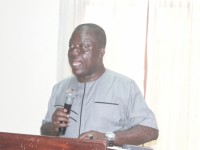For some time now, some candidates who sat for the November/December 2014 West African Senior School  Certificate Examination (WASSCE) have been receiving calls from people who introduce themselves simply as staff of the West Africa Examination Council (WAEC).
Certificate Examination (WASSCE) have been receiving calls from people who introduce themselves simply as staff of the West Africa Examination Council (WAEC).
These people claim to have access to the WAEC results database and can alter results for candidates, usually for huge amounts of money.
A candidate who spoke to The Mirror said she received a call from an unknown number telling her she had scored D7 in an English paper she wrote last year.
The caller gave out details of her index number, number of subjects she wrote and her examination centres.
He also told her she had failed the English Language paper and that she could be given a better grade before the results were officially released if she would part with a certain amount of money.
‘I was very convinced because he had all my details. I panicked because it was the third time I had sat for those papers. I asked for the mode of payment and he said I could do it through a mobile money transfer,” she explained.
The candidate, who was required by her tertiary institution to better her grades or face dismissal, said out of desperation she told the caller she wanted a B2 grade and that she would need some time to raise the GH¢3,000 required.
‘I told him I needed a number to call when the money was ready but he said I had just a week to raise the money and that he could reduce the amount if I had ready cash. I didn’t have that kind of money then so I asked him to call back, which he never did,’ she added.
Surprisingly, few weeks after the results were released on the official website of WAEC, this same candidate checked her results only to find out she had scored B3 and not D7 as the caller made her believe.
She said she was surprised because she did not transfer any money to the supposed WAEC official to better her grades and that she would have been duped if she had sent money to the caller.
The Principal Public Affairs Officer of WAEC, Agnes Teye-Cudjoe, in an interview with The Mirror, said her outfit was aware of fraudulent individuals posing as officials from the council.
She said apart from carrying advertisements in newspapers, WAEC also sent out text messages to all candidates who sat for the exams, warning them against activities of exam results fraudsters.
According to the WAEC official, she suspected the fraudsters worked at internet cafes where the candidates registered for the exams so it was easy for them to have access to all the candidates’ details.
“These fraudsters, obviously, cannot alter results as their predictions were even not right. We have reported the cases to the police and investigations are ongoing,” she stated.
Mrs Teye-Cudjoe advised that all candidates who received such calls or messages should report to the police.
Explaining how mobile money works, the Commercial Senior Manager, MTN Mobile Money, Mr Eli Hini, said the platform was only a channel for transferring money or making payment and so just like issuing a cheque to someone or transferring money to a bank account, the duty lies on the sender to be sure of who the receiver was.
He said all mobile money accounts or wallets are registered and so it was possible to trace the recipient if a report is made to the right authorities.
“One cannot use a mobile money account or wallet if the number is not registered. The registration makes it possible for us to have all details of the various accounts so once we receive an official notice from the complainant and the police, we can easily assist to trace the receiver,” he explained
Mr Hini said if a report was made on time, it was possible to block the account of the recipient so he or she is not able to use the money and the amount refunded to the complainant after investigations are concluded
He said after tracing the account of the recipient, the case is then handed over to the police for the necessary actions to be taken and the account is subsequently closed.


